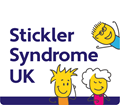Story
Thanks for taking the time to visit my JustGiving page.
Stickler syndrome is a common but little recognised genetic disorder. One in 10,000 persons may be affected, although many medical professionals believe that the figure is considerably higher. Symptoms are variable and can present in different ways even with the same family.
When a symptom appears, it is usually treated by a health professional from one particular discipline (e.g. ophthalmologist, cleft team member, rheumatologist, or an audiologist). Unless all these professionals are aware of the wide range of symptoms which are characteristic of Stickler syndrome (e.g. high myopia, unexplained retinal detachments, early cataracts, a cleft or high-arched palate, hypermobile and/or painful joints, hearing loss etc.) a diagnosis may not be made. Even though Stickler syndrome is a genetic condition, some individuals may present with no clear family history of the condition, and once again a diagnosis can be missed.
How SSSG can make a difference
- By raising awareness of Stickler syndrome amongst medical professionals and the general public.
- By emphasising the value of early diagnosis for adults and children with the condition.
- By stressing in our literature, and to all professional and family contacts, that prompt treatment for retinal detachment and other eye problems associated with the condition can help to preserve vision.
- By producing clear and accurate information about Stickler syndrome in print and on our website.
- By organising conferences, family days and other events for affected families and for professionals who want to be informed about the condition.
- By taking our leaflets and display stand to events aimed at medical professionals, and at people with a visual or hearing impairment, or with restricted mobility.
- By encouraging individuals and families affected by Stickler syndrome to become members of the SSUK so that they can be updated on medical research and receive copies of all new SSUK publications.
- By helping to alleviate feelings of isolation and distress in affected individuals and families throughout the UK, especially when they are undergoing medical procedures related to Stickler syndrome.
- By encouraging medical and other professionals to join our mailing list so that they can receive all SSUK publications and thus be better able to advise sufferers and offer appropriate support.
